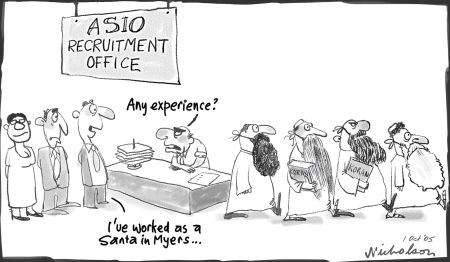Search
Democracy Links
Member's Off-site Blogs
from watch dog to guide dog .....

from Crikey …..
Ul-Haque case gives ASIO licence to play rough
Greg Barns writes:
Last Friday, the federal Attorney-General Robert McClelland released a censored version of the findings of Ian Carnell’s report into the treatment by ASIO officers of a former terrorism suspect Izhar Ul-Haque.
Mr Carnell, who is the Inspector General of Intelligence and Security (IGIS) has, despite damning findings two years ago by New South Wales Supreme Court judge Michael Adams about the conduct of the ASIO officers, exonerated them from wrongdoing.
Izhar Ul-Haque was charged with training with an alleged terrorist organization in Pakistan in 2003. ASIO interviewed him three times in late 2003, early 2004 about the matter.
Justice Adams, in a ruling delivered on November 13, 2007, outlined a disturbing level of intimidation and aggression used repeatedly by ASIO to try and break the will of Mr Ul-Haque. The case against Mr Ul-Haque collapsed.
Justice Adams found that at "7.25pm on 6 November 2003, twenty or so ASIO and four or five police officers, all in plain clothes, attended with a search warrant at the home where the accused lived with his parents and three brothers."
Earlier that day ASIO has met Mr Ul-Haque and his 17-year-old brother in a railway station car park. They told Mr Ul-Haque he was in serious trouble, bundled him into a car, took him to a local park and forced him to answer questions. They took his frightened brother along as well -- an action described by Justice Adams as "highhanded".
Justice Adams found:
The officers were dealing with a young man of twenty-one years. It is obvious that any citizen of ordinary fortitude would find a peremptory confrontation of the kind described by the ASIO officers frightening and intimidating. Furthermore, the fact that he was being taken to a park rather than any official place would have added an additional unsettling factor. I do not think it can be doubted that this was precisely the effect that was intended.
And despite having no authority to do so, the ASIO officers gave Mr Ul-Haque the distinct impression that he had to cooperate with them and answer their questions. If he did not, he reasonably assumed they might beat him up or take him to another sinister location.
Then the ASIO officers took him back to his home, kept him in his parents' bedroom and proceeded to interview him again until 3.45 the next morning. None of which impressed Justice Adams who observed, "To my mind, to conduct an extensive interview with the accused, keeping him incommunicado under colour of the warrant, was a gross breach of the powers given to the officers under the warrant."
Justice Adams was not impressed by the evidence of the ASIO officers and in his view they had kidnapped and falsely imprisoned Mr Ul-Haque and trespassed on his family’s home.
Disappointingly, Mr Carnell has essentially let ASIO off the hook. Unlike Justice Adams, who had the benefit of hearing all sides of the story, Mr Carnell heard only from ASIO and he concludes there was no trespass, false imprisonment or unlawful detention.
Mr Ul-Haque chose not to give evidence or make a submission to the Carnell inquiry. Why would he, given he had been vindicated in the New South Wales Supreme Court?
The failure of Mr Carnell to take a similar view as Justice Adams did about the mistreatment of Mr Ul-Haque by ASIO officers is disturbing. It sends a signal to that organization that the IGIS, even in the face of findings of a senior judicial officer who heard considerable evidence, is prepared to accept that ASIO officers can play rough with citizens.So much for the IGIS being a watchdog.
- By John Richardson at 18 Nov 2008 - 5:50am
- John Richardson's blog
- Login or register to post comments
Recent comments
35 min 40 sec ago
2 hours 59 min ago
4 hours 19 min ago
4 hours 27 min ago
12 hours 38 min ago
13 hours 51 min ago
16 hours 35 min ago
17 hours 15 min ago
17 hours 35 min ago
20 hours 24 min ago